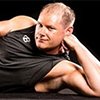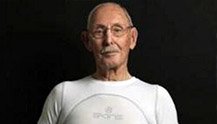
Lessons From A 95-Year-Old Bodybuilder
Charles Eugster may be 95 years old, but he is far from decrepit. He started bodybuilding at age 87 and keeps breaking his own speed records. Learn what he has to say about exercise, aging, and more!
Dr. Charles Eugster grew less and less active as he aged. The athletic glories of his youth gave way to sedentary married life. Summer days rowing and boxing slowly transitioned into couched evenings in front of the telly. For 40 years, Eugster put his athletic pursuits on the back burner as his children and dental practice grew.
But idleness did not sit well with the British sprinting champion, so he began resharpening his athletic edge in his mid-60s. Eugster started skiing and pulling oars again, beginning a remarkable run in sports. For two decades, he went on to dominate senior rowing, winning 36 masters gold medals.
Eugster's efforts rewarded him, but the deterioration of his body eventually became evident. At 85 years old, Eugster was widowed by his second wife, and his muscles had slacked considerably. He had a "pancake butt," as he puts it, and that spurred him into a new pursuit: bodybuilding. Eugster wanted muscle and an Adonis body. He craved strength, a longer life, and the attention of "babes."
So, Charles Eugster began hitting the iron at age 87. He started supplementing with whey protein, lifting weights, and sprinting again. Success soon followed. He won three Stren-Flex World titles, and recently broke the 200 meter and 60 meter world records for the 95+ age group.
Charles Eugster's 200m World Record from Silver Grey Sports Club
Watch the video - 2:19
The record holder now lives in Zurich, Switzerland. He travels the world speaking to groups of people of all ages about the benefits of bodybuilding, clean eating, and active living. He asks his audiences to never retire, to activate their bodies and minds, and to hunt for excellence in existence.
Bodybuilding.com recently caught up—not on the track, of course!—with the 95-year-old powerhouse to talk exercise, aging, retirement, the global state of fitness, and much more.
Why did you start bodybuilding at age 87?
From the age of about 50, people lose about 1-2 percent of their muscle mass every year! With the loss of muscle mass, they lose muscle strength, and they lose muscle power. That was happening to me. The idea of me joining a bodybuilding club was to try to regain those qualities.
The result was fairly good, but [my first] coach coached me according to his own experience, not backed by science. I later found my current trainer who used more of a functional training system. She was able to rebuild my body completely by the age of 89. These last five years have been a lot better.
Can older people who have never worked out jump right into bodybuilding?
No, no. It has to be done slowly. It has to start with functional training—exercises that carry over to activities of daily living, like balance and agility drills, stretching, swimming, and bodyweight exercises. I recently discovered that without supplements—especially without whey supplements—it just doesn't work.
Another important thing occurs to me: the genetic makeup of people. According to Professor James A. Timmons, about 20 percent of people simply do not react to resistance exercise. A lot depends upon your genetic makeup. Therefore, I think it is extremely important for people to have genetic tests to determine what their nutrition should be and types of exercise they should perform.
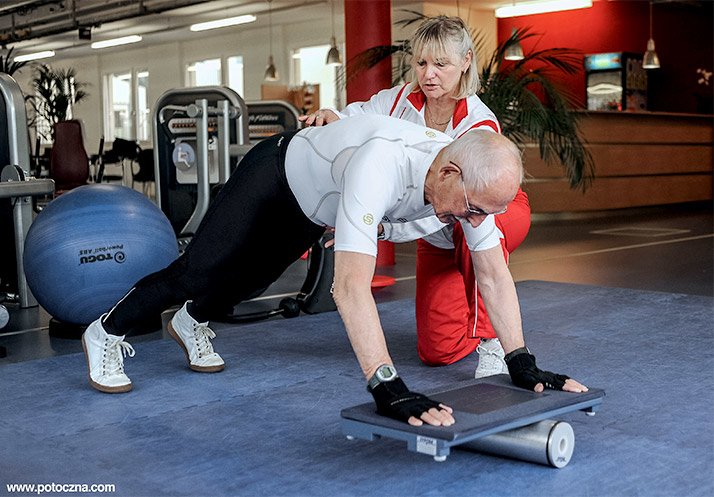
According to my genetic makeup, I am not an endurance person—in spite of the fact that I was rowing for so long. I am more of a power person, and that is probably why I was able to break world records with very little training and practically zero experience in running. I think genetic tests are extremely important, because a lot of people may be training hard and just not getting any results whatsoever simply because of their genetics.
For forty years, you were a couch potato. Why did you decide to get up?
I started my dental practice, got married, and produced kids. My wife was not the sporty type. I tried to adapt my life to hers and that didn't work for me.
I was playing tennis, skiing, swimming, perhaps a little bit of rowing. I was semi-average and inactive until I was 63 years old. I discovered that there was an age category in the rowing masters for 60-year-olds, so I started training with another rower.
We were rowing in the doubles and singles. We were training six days a week on a regular basis, year in and year out. We would go out every day and row for about an hour.
Were you doing any resistance training at that point?
At that time? None whatsoever. We were reasonably successful and won a few regattas and a few prizes. When my partner dropped out in 1997, I continued, and I rowed at the World Masters until 2011. Up to the age of about 80-85, things seemed to be going OK, but then my body seemed to deteriorate in spite of the fact that I was training six days a week.
I'm extremely vain and I wanted to rebuild my body. I started with weight training, which didn't seem to do an awful lot of good. It certainly helped, but then I joined a bodybuilding club at the age of 87 and I hired the previous Mr. Universe to coach me.
I was still rowing then. I was surprised to hear that with bodybuilding [at my age] you can only train about three times a week instead of the six times a week! That was completely new to me. The problem was how to incorporate my rowing training with the bodybuilding training. I eventually gave rowing up altogether!
Did your weight change when you started weightlifting and sprinting?
The first thing I had to do was lose 12 kilos, because I had a spare tire! It wasn't a big spare tire, but it was sort of a bicycle tire and a couple of muffins. I managed to get rid of the fat at the rate of a kilo per month. I lost 12 kilos over a year. After my experience, I am convinced that older people should be into bodybuilding and strength building.
I discovered that sprinting is a type of HIIT, and according to some research, sprinting seems to be very beneficial for older people with heart problems. Obviously, you can't expect older people to do intensive interval training without previously having developed a certain amount of strength and muscle mass. I am now absolutely convinced that bodybuilding is essential for older people.
Do you have a specific diet you follow?
According to the type of sport you do and the type of exercise you do, your diet has to be modified accordingly. For instance—although it actually seems to be rather questionable—if you are training for endurance, you should have more carbohydrates. If you are more of a power athlete in a sport that requires more power, then you should have more protein. But, the diet question is completely unsolved because there are so many individual factors involved.
For example, diet may depend on your age, gender, location, goals, and other factors. Nutrition seems to be an absoluty individual type of thing. As far as diet is concerned, I am continuously experimenting.
What type of experiments?
At the moment, I am convinced that fat and meat—which are often regarded as things to be avoided—are something I should welcome. I have found it extremely difficult to purchase fatty foods. It's all low-fat, or all the fat is taken out! I've even seen butter with 45 percent less fat! I don't know what that is! And skimmed cream and skim milk—you don't seem to be able to find anything that has fat in it.
I think that may be one of the reasons why there are so many people who are obese. In the United States, it is estimated that, by 2030, 44 percent of the population will be obese. It's absolutely amazing! And then, of course, diabetes is a pandemic throughout the whole world. The figures state that over 13 percent of the world's population is obese and only half of the cases may have been diagnosed.2
Our diet is completely wrong. If people say to me that fat and meat are dangerous, then I will say, "Look, our diet up to now has produced terrible results, and there must be something wrong with it." It seems to me that there are many factors involved, and it is almost impossible to give a dietary recommendation [for everyone].
Follow your instincts. I'm a firm believer that what you fancy does you good.
What are the biggest threats people face as they age?
The main loss of human potential is retirement. Retirement is a financial catastrophe and a physical disaster. Most people don't seem to realize in this day and age that roughly 30 percent of their adult lives will be spent in retirement. That, in my opinion, is devastating.
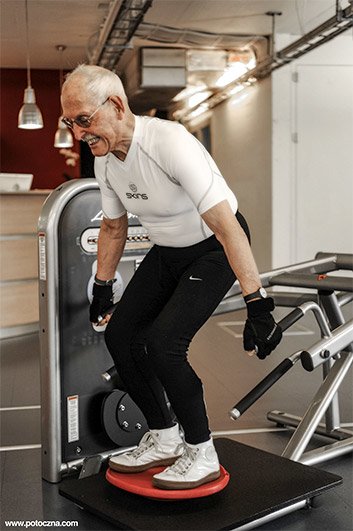
We pour experience, talent, and knowledge down the drain. It is absolutely incomprehensible! The most important thing to stay healthy in old age is to work. Then comes nutrition, and then exercise.
A number of research papers suggest that the frontal part of the brain shrinks with obesity.9 Now that is terrifying! If you estimate that almost 50% of the American population is going to be obese by 2030, then half the population of the most powerful nation in the world could have shrinking brains. Now that is frightening!
What we are doing to ourselves is absolutely unbelievable, and nothing good is done about it. The World Health Organization has said that chronic disease in old age is preventable. In the United States, the Centers for Disease Control and Prevention is saying exactly the same thing, but where is the prevention? I don't see any serious prevention for chronic disease in older people. It's just not there. We are ignoring something. I'm almost bursting a blood vessel!
It is frightening, really. I want to see if I can somehow make people wake up and realize what the hell is happening!
How do we fix these issues?
Well, one of the major things that we have to do is to get rid of retirement. Encourage people to work as long as possible, encourage people at retirement age to restudy, to start their lives completely again, and make it quite clear that one can rebuild one's body at any age!
That is one of the most powerful things. A lot of people have lousy bodies, but they must realize that it is possible for them to rebuild their bodies and rebuild their lives at any age. That is one of the messages I want to get across!
What is your opinion of care facilities and nursing homes? How do they factor into the equation?
You must not forget that people who live in these facilities are in a community where everybody has something wrong with them. They assume that it is perfectly natural for people in old age to have some form of disease. Because of that, there is little incentive to do anything about it.
I think there are three main fixes:
- Education, of the mind and body.
- Establish some sort of facility where people can increase their strength and muscle mass.
- Adopt high-protein diets! In these homes, the diet is [often] sharply skewed to carbohydrates. Older people love something sweet; they like their cakes and tea.
It's extremely difficult to encourage somebody who has never done any sport or physical activity in his life to realize how important it is. We must encourage far more masters or veterans sports in the older categories. Make them more popular, make them more visible, and that would probably help a great deal.
We need to have older people who have rebuilt their bodies become role models, so people [in homes] can see it is possible in later life to start something new and learn something new.
Why is retirement so devastating?
One of the most interesting discussions here is about the cognitive aspect of aging. It is not that cognitive awareness deteriorates in old age. That is not true; it simply changes. Older people have a slightly different way of thinking than younger people, but the thought process does not deteriorate.
One of the most devastating things is that dementia cases increase from the age of retirement. It increases! In fact, it doubles every five years. It's estimated that 32 percent of people age 85 and older have Alzheimer's!8
That increase has to do with retirement itself. Most people in our modern world use their brains in their working lives, and it's absolutely devastating for somebody to be cut off from work at the age of 65. In other words, brain-training stops. There isn't any real brain exercise offered.
There's an interesting report actually from Canada about energy expenditure.3 Energy expenditure drops rapidly for people in working-level occupations at the retirement age. There is little to no energy expenditure in their daily life. That is, of course, something that our bodies cannot stand!
If the body isn't meant to rest, what's it supposed to do?
Our bodies are those of hunter/gatherers. Our bodies are designed for a certain amount of physical activity. As a hunter/gatherer, you have to have considerable exercise. One estimate says a modern equivalent is walking about 20 kilometers or running 20 kilometers every day in order to find food. But, it's most distressing that we do not really know the optimum type or the optimum energy expenditure we need to keep our body healthy as it was designed.
We are eating completely different things than our bodies were actually designed for. When you see all these rows of sweet drinks, our hunter/gatherer bodies were simply not designed to accommodate that type of stuff. A hunter/gatherer was someone who had to search for food. He had to use his mind all the time. There was no question of retirement. You cannot imagine a hunter/gatherer being retired, right? And so it should not be a part of our society!
There's a professor in the United States who calls these things "mismatches." [He says] we are making demands of our bodies that our bodies were not adapted for. One of those mismatches is sitting down. Hunter/gatherers did not sit; they squatted. There is a tendency now to work and try to encourage working in a standing position, or at least getting up and walking around your desk after every 30 minutes or something.
There is a research by Northwestern University to suggest that increasing sitting time has the danger of increasing potential for cardiovascular problems.6 We are doing a lot of things to ourselves that are damaging to our health.
Inactivity is just one of the important things we are doing to ourselves. Inactivity is, I think, the fourth preventable cause of death. It's a real serious condition. We have instituted so many labor-saving devices, and the result is that we have a population that is inactive.
Why bodybuilding at age 93 is a great idea Charles Eugster at TEDxZurich
Watch the video - 16:31
Talk to me about your own exercise regimen.
The exercises that I do in the gym are determined by my coach. I just do what she tells me!
The point is not the exercise [itself]. The point is our specific aim. At the moment, we are aiming at sprinting. My exercise regimen is more devoted to coordination, to strengthening certain muscles that I would use in the sprint.
The other important training factor is that these exercises have to be completely changed at the end of 4-5 weeks. You must never have a training regimen that repeats over and over again. Your muscles must be always surprised! The training regimen is extremely varied and must not be just a routine. That is one of the things a lot of fitness clubs seem to miss. They have a certain routine, and it just doesn't work long-term.
For sprinting, I have a leg press, and I do exercises where I spread my knees. There are a lot of things to exercise: the thighs, the back of the thighs, calves and so forth. But the other important thing—as far as sprint running is concerned— is that the upper body also has to be trained.
The thing I like about sprinting is that, when you look at the top sprinters, they've all got magnificent bodies. Their bodies are full of muscle! You look at the marathon and long-distance runners and they are just matchstick men. There is just nothing there, and that is why I personally think that sprinting is so valuable for older people.
How do we encourage older people to sprint and lift?
I've only really begun to study and work out the situation for older people, which is neglected. There is only one fitness center I've been able to find [specifically] for older people. It's called NiftyOverFifty, and I don't think we have even one in Europe—which is amazing!
Older people may be [considered] sick and old and hopeless, but they've got cash! I don't understand why the fitness industry hasn't pounced upon them! The difficulty is getting older people into the gym, but once you've got them there, they will see the enormous benefits. I can assure you these benefits occur rapidly—far more rapidly than in any other age group. That is fascinating!
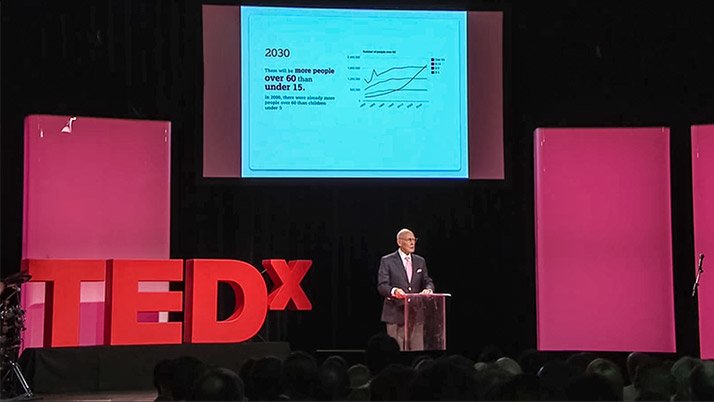
My coach did research on 70-year-old people for increasing their strength. She trained them about twice a week for about 3 months. At the end of 3 months, the average increase was 400 percent in strength. It's rapid! When older people realize this increase, then they [keep exercising].
They're not like the average age group in the fitness center, which is between 30 and 50, where the retention rates are extremely poor. Older people would have amazing retention rates. The older people may need more attention and slightly different equipment, but God there's an opening there.
I have about two days a week when I can go running. I run first and then do some sprinting just as fast as I can, and that's about it. We've had enormous amount of trouble because of the terrible conditions that we've had here in Switzerland. The heavy snow, which you've also had in the United States, made it extremely difficult to train outdoors this winter.
Do you take any supplements? How often?
The first supplement I'd like to point out, especially as older people are concerned, is vitamin D. Vitamin D is often very low in older people, especially if you train inside in a gym. But, it is very important that people are tested. It seems like a number of people are taking vitamin D unnecessarily.
When [my partner and I] were training rowing, we were outdoors and I had no Vitamin D deficiency. From the moment I started training in the gym for considerable amounts of time, it was the start of me having a vitamin D deficiency. It may be quite a good idea for people who train in the gym to be tested whether they have a vitamin D deficiency.
Along with vitamin D, I take omega-3 fats and whey protein. At this time, my coach wants me to take a whey protein drink every morning, which I hadn't done previously. I had only taken my whey protein before and after training. Now, I take it in the morning, before my workouts, and after. With the training I am doing, I am continuously experimenting.
Any final thoughts?
I can only make two points. One: No retirement, because I think that is killing us. Two: Bodybuilding and exercise for older people. Get them in the gym! Continuously change your routines! Rebuild your body!
Dr. Charles Eugster aims to add new world sprinting titles to his long list of accolades in Lyon, France in July 2015.
References
- Davidsen, P. K., Gallagher, I. J., Hartman, J. W., Tarnopolsky, M. A., Dela, F., Helge, J. W., ... & Phillips, S. M. (2011). High responders to resistance exercise training demonstrate differential regulation of skeletal muscle microRNA expression. Journal of Applied Physiology, 110(2), 309-317.
- Obesity and overweight. (2015). Retrieved from http://www.who.int/mediacentre/factsheets/fs311/en/
- Csizmadi, I., Lo Siou, G., Friedenreich, C. M., Owen, N., & Robson, P. J. (2011). Hours spent and energy expended in physical activity domains: results from the Tomorrow Project cohort in Alberta, Canada. International Journal of Behavioral Nutrition and Physical Activity, 8(1), 110.
- Pennings, B., Boirie, Y., Senden, J. M., Gijsen, A. P., Kuipers, H., & van Loon, L. J. (2011). Whey protein stimulates postprandial muscle protein accretion more effectively than do casein and casein hydrolysate in older men. The American Journal of Clinical Nutrition, 93(5), 997-1005.
- Pennings, B., Boirie, Y., Senden, J. M., Gijsen, A. P., Kuipers, H., & van Loon, L. J. (2011). Whey protein stimulates postprandial muscle protein accretion more effectively than do casein and casein hydrolysate in older men. The American Journal of Clinical Nutrition, 93(5), 997-1005.
- Brose, A., Parise, G., & Tarnopolsky, M. A. (2003). Creatine supplementation enhances isometric strength and body composition improvements following strength exercise training in older adults. The Journals of Gerontology Series A: Biological Sciences and Medical Sciences, 58(1), B11-B19.
- Dunlop, D., Song, J., Arnston, E., Semanik, P., Lee, J., Chang, R., & Hootman, J. M. (2014). Sedentary Time in US Older Adults Associated With Disability in Activities of Daily Living Independent of Physical Activity. Journal of Physical Activity & Health.
- Robert Wood Johnson Foundation. (2010). F as in Fat: How Obesity Threatens America's Future.
- Hebert, L. E., Weuve, J., Scherr, P. A., & Evans, D. A. (2013). Alzheimer disease in the United States (2010–2050) estimated using the 2010 census. Neurology, 80(19), 1778-1783.
- Obesity and overweight. (2015). Retrieved from http://www.who.int/mediacentre/factsheets/fs311/en/
